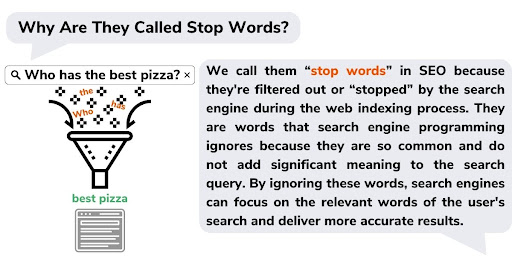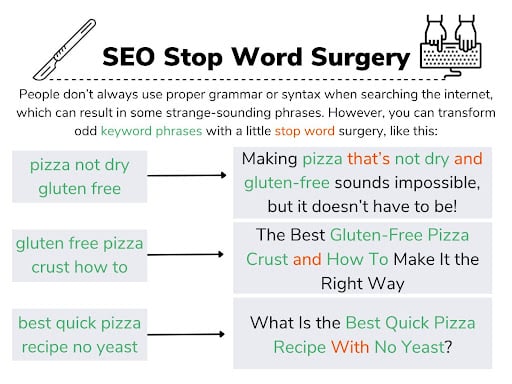SEO Stop Words List
June 7, 2023 •Allison Lemasters

Stop words—like “and,” “on,” “in,” “at,” and so on—are like ice cubes in a drink. They take up space without adding much flavor. Sometimes stop words are necessary, though, like the need we have for ice in our beverages on hot days. Stop words can smooth the edges of our writing and speech, improving flow and readability.
At the same time, SEO writers and strategists should beware of using stop words in excess. Too many stop words can dull your writing, like how too many ice cubes will water down a drink. Stop word usage is a delicate balance, and different contexts require unique considerations—all of which we will explore in this guide.
And if you’re already an expert on stop words and need an SEO Stop Words List, there’s one for you at the bottom of this blog!
Why Are They Called Stop Words?
We call them “stop words” in SEO because they're filtered out or “stopped” by the search engine during the web indexing process. They are words that search engine programming ignores because they are so common and do not add significant meaning to the search query. By ignoring these words, search engines can focus on the relevant terms of the user's search and deliver more accurate results.

This fact does not mean you shouldn’t use stop words. In Google’s recent Helpful Content Update, they discuss various updates made to reward websites for making “people-first content” and recommend “avoid[ing] creating content for search engines first.” If your use of stop words improves your website’s readability and increases visitor satisfaction, then that is ultimately what matters.
What Are Examples of Stop Words?
You just read three in that question: ”what,” “are,” and “of.” “Examples: Stop Words'' would probably carry the same meaning well enough. It sounds a bit robotic, though, and human writers can do better than some AI-sounding, scraped-and-taped content. Balance is critical—convey your point clearly, but also be a human (which stop words can help with).
So, how do you choose stop words for SEO purposes? Let’s say you’re using the DemandJump platform to do SEO keyword research and follow Pillar-Based Marketing (PBM) best practices. Your strategy is to create a network of content around the topic “healthy homemade pizza” while including nods to your gluten-free pizza-making kits. The goal is to increase SEO for your website and pull more organic traffic, specifically hungry folks looking for tasty pizza with zero gluten.
In the DemandJump platform, you type in “healthy homemade pizza” and run an Insight Report. Some of the keyword phrases and questions sound grammatically correct and could serve multiple content mediums. Other phrases are…off, for lack of a better word, like:
- pizza not dry gluten free
- gluten free pizza crust how to
- best quick pizza recipe no yeast
People don’t always use proper grammar or syntax when searching the internet, which can result in strange-sounding phrases. However, you can transform each of these odd keyword phrases with a bit of stop word surgery, like this:
- A sentence: Making pizza that’s not dry and gluten-free sounds impossible, but it doesn’t have to be!
- A blog title: The Best Gluten Free Pizza Crust and How To Make It the Right Way
- A blog section header: What Is the Best Quick Pizza Recipe With No Yeast?

So adding stop words in small doses for flow or clarity—go for it. However, this brings us to another crucial question for any SEO writer and strategist…
Is It Good to Remove Stop Words?
Whether or not removing a stop word is a good idea depends on the keyword in question, the stop word, and the context. In some cases, removing stop words can reduce the noise in the text and make it more concise. Yet, in other instances, stop words can provide important grammatical cues and add meaning to the text, so removing them might make the content unclear or inaccurate.
Consider the keyword phrase “best way to make pizza at home.” If you take out the “at,” you have “best way to make pizza home.” While endeavoring to construct an entire home out of pizzas seems like a fun adventure, it’s likely not what you meant.
This is a silly example to make a point. Any time your research results in keyword phrases with stop words, weigh the pros and cons of their removal. Will it change the meaning? Are vast amounts of people searching for that phrase with that stop word? Does your audience care? Ask yourself these questions each time you’re on the fence about removing a stop word.
How Do You Identify a Stop Word?
If it’s a common and relatively insignificant word you see frequently, it might be a stop word. These words are often short and have little individual meaning, and they are usually articles, prepositions, conjunctions, or pronouns.
The more you write and mess around with stop words, the easier they will be to identify. In the meantime, the simplest way to identify stop words is by referencing a handy stop words list, like the one at the bottom of this article.
What Is the Standard List of Stop Words?
Unfortunately, Google and other search engines don’t provide much clarity around the topic of stop words, so there isn’t one standard list that everyone turns to. Whether or not a word is a stop word can vary based on so many factors, like the search engine’s algorithm or the search query itself.
Based on our own research and writing here at DemandJump, our team has compiled a list of stop words we have noted through our own SEO writing and research.
How Do I Make a List of Stop Words?
You could make your own list of stop words, but it’s way easier to use ours instead! Although it might be helpful to create a shortlist of the ones you tend to use the most for easy reference.
SEO Stop Words List
From A to Z, here are some common stop words you can use in your SEO writing and content creation.
A
- a
- about
- above
- according
- across
- actually
- after
- again
- against
- all
- almost
- also
- although
- always
- am
- among
- amongst
- an
- and
- any
- anything
- anyway
- are
- as
- at
B
- be
- became
- become
- because
- been
- before
- being
- below
- between
- both
- but
- by
C
- can
- could
D
- did
- do
- does
- doing
- down
- during
E
- each
- either
- else
F
- few
- for
- from
- further
H
- had
- has
- have
- having
- he
- he'd
- he'll
- hence
- he's
- her
- here
- here's
- hers
- herself
- him
- himself
- his
- how
- how's
I
- I
- I'd
- I'll
- I'm
- I've
- if
- in
- into
- is
- it
- it's
- its
- itself
J
- just
L
- let's
M
- may
- maybe
- me
- might
- mine
- more
- most
- must
- my
- myself
N
- neither
- nor
- not
O
- of
- oh
- on
- once
- only
- ok
- or
- other
- ought
- our
- ours
- ourselves
- out
- over
- own
S
- same
- she
- she'd
- she'll
- she's
- should
- so
- some
- such
T
- than
- that
- that's
- the
- their
- theirs
- them
- themselves
- then
- there
- there's
- these
- they
- they'd
- they'll
- they're
- they've
- this
- those
- through
- to
- too
U
- under
- until
- up
V
- very
W
- was
- we
- we'd
- we'll
- we're
- we've
- were
- what
- what's
- when
- whenever
- when's
- where
- whereas
- wherever
- where's
- whether
- which
- while
- who
- whoever
- who's
- whose
- whom
- why
- why's
- will
- with
- within
- would
Y
- yes
- yet
- you
- you'd
- you'll
- you're
- you've
- your
- yours
- yourself
- yourselves
When you’re ready to write for SEO, check out DemandJump! Our marketing strategy platform will show you precisely what content to create to improve search engine rankings. Plus, it’s completely free to try! Click the button below to see what your target audience is searching for.
Featured Articles
Categories
- Attribution Tracking (13)
- Channel Optimization (11)
- Consumer Insights (68)
- Content Marketing (251)
- Data Science (8)
- Digital Marketing (6)
- Digital Transformation (26)
- Enterprise (10)
- Lead Generation (14)
- Market Intelligence (8)
- Marketing Analytics (39)
- Marketing Attribution (57)
- Marketing Management (153)
- Marketing Operations (86)
- Organic Search (222)
- Paid Search (52)
- Pillar-Based Marketing (63)
- Programmatic Advertising (9)
- SaaS Content (14)
- SaaS Marketing (29)
- Search Marketing (111)
- SEO Keyword Research (28)
- SEO Pillar (18)
- SEO Strategy (46)
- SMB (5)
- Website Content (12)


